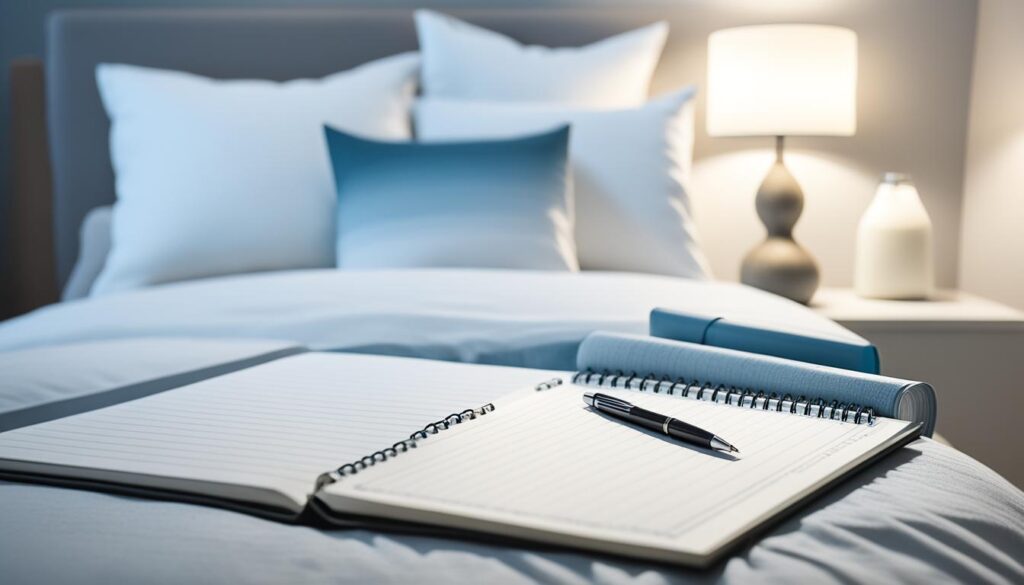Discover the secret to better nights and rest your body needs. This guide shares 7 key rules to improve your sleep habits. You’ll learn how to make your sleep area comfy and develop a calming bedtime routine. Say hello to restful nights and goodbye to sleepless ones.
Key Takeaways
- Aim for 7-8 hours of sleep each night for optimal rest
- Maintain a consistent sleep schedule to regulate your body’s internal clock
- Create a comfortable and dark sleep environment to promote restful sleep
- Avoid screen time and blue light exposure before bedtime
- Incorporate daily exercise and natural light exposure for better sleep
Table of Contents
Understanding the Importance of Proper Sleep
Sleep is key to our overall health. It keeps our bodies and minds in top shape. Adults need seven to eight hours of sleep each night for good health. Only a few people can manage well with less sleep.
Sleep affects many parts of our lives. It helps our immune system, heart, brain, and emotions. Not getting enough sleep can lead to serious health issues like obesity, diabetes, and heart disease.
The Impact of Sleep on Overall Well-being
Poor sleep quality can harm us. It makes us tired, unfocused, moody, and forgetful. This can hurt our work, decisions, and life quality. Just one bad night can make us feel tired, irritable, and unable to think clearly.
Not sleeping enough is linked to many serious health problems. These include heart disease, cancer, strokes, accidents, diabetes, sepsis, and high blood pressure. It also affects neurologic disorders like Alzheimer’s disease. Getting help for sleep issues early can slow down disease progression.
Getting enough sleep is key to staying healthy. The amount needed changes with age, with infants needing the most and adults at least seven hours. A regular sleep schedule and a comfy sleep space can help you sleep well and stay healthy.
Optimize Your Sleep Environment
Creating a cozy sleep space is key for good sleep quality. Your bedroom’s setup greatly affects how easily you fall and stay asleep. By focusing on temperature, lighting, and noise, you can make an optimal sleep environment that helps you sleep deeply and restfully.
Cultivate a Cozy Sleep Sanctuary
Invest in a supportive mattress and quality bedding for comfort all night. Keep your room cool, between 60 and 67 degrees Fahrenheit, for the best sleep. Use blackout curtains, earplugs, or a sound machine to block out light and noise, making a comfortable sleep space for you.
Add relaxing design elements like soft textures, calming colors, and gentle lighting. Avoid harsh bright lights and choose warm, dimmable bulbs or candles for a cozy feel. Tailor your sleep space to what you like to improve your sleep quality.
“The bedroom should be a sanctuary – a place to rest, recharge, and rejuvenate. Creating a space that feels calming and inviting can have a profound impact on the quality of your sleep.”
For a comfortable sleep space, focus on reducing disruptions and making a haven for your sleep cycle. Try different elements until you find the best mix for deep, restful sleep.
Establish a Consistent Sleep Schedule
Getting good sleep starts with a regular sleep schedule. Going to bed and waking up at the same time every day, even on weekends, helps your body get into a rhythm. This makes it easier to sleep well and wake up feeling fresh.
Most adults need 7-9 hours of sleep each night. To get enough rest, plan your bedtime and make sure you have enough sleep time. Avoid sleeping in late and try to keep your sleep patterns steady for better sleep and more energy during the day.
Creating a consistent sleep schedule means having a calming bedtime routine. Doing relaxing things like reading, listening to soft music, or doing yoga can help you get ready for sleep. It’s also important to avoid screens before bed to help you sleep better.
Being consistent with your sleep is crucial. A regular sleep cycle can make you feel better, improve your mood, and help you think clearer during the day. A consistent sleep schedule is a great way to get the most out of your sleep.
“Consistency is the key to building a healthy sleep routine. By sticking to a regular bedtime and wake-up time, you can train your body to fall asleep and wake up more easily, leading to better overall sleep quality.”
Practice Relaxation Techniques Before Bedtime
Using relaxation techniques before bed can change how well you sleep. They calm your mind and body, making it easier to fall asleep. Let’s look at some good ways to relax and get ready for sleep.
Effective Methods for Winding Down
Deep breathing is a strong way to relax. Try the 4-7-8 breathing method: Breathe in for 4 seconds, hold for 7, and breathe out for 8. This can lower anxiety, help your heart rate, and make you feel calm. Doing this often can help you fall asleep faster.
Other calming activities you can add to your bedtime routine include:
- Gentle stretching or yoga
- Guided meditation or visualization exercises
- Listening to calming music or nature sounds
- Taking a warm bath or engaging in progressive muscle relaxation
These relaxation techniques quiet the mind and release tension. They get your body ready for sleep. Try different ones to see what works best for you and do them every night.
“Relaxation exercises like deep breathing, meditation, and progressive muscle relaxation can significantly improve sleep quality and duration.” – Rebecca Robbins, sleep expert
Adding these relaxation techniques to your evening can greatly improve your sleep and health. By focusing on relaxing before bed, you’ll get the restful sleep you need.
Limit Screen Time and Blue Light Exposure
Using devices like smartphones and computers can mess with your sleep cycle. This is because blue light from these devices can stop your body from making melatonin, the sleep hormone. To help sleep better, try to cut down on screen time before bed.
Screen time can also keep you awake because it makes you feel alert. Having a tech-free time before bed can make it easier to wind down. This can help you sleep better.
Here are some tips to reduce blue light exposure and screen time before bed:
- Set a technology curfew and avoid using screens for 30-60 minutes before bedtime.
- Create technology-free zones, especially in the bedroom, to limit nighttime blue light exposure.
- Use blue light filters on your devices or wear blue light blocking glasses to combat the adverse effects of blue light.
- Switch to red lights for evening reading lamps and nightlights to avoid melatonin suppression.
- Expose yourself to bright light during the day to help synchronize your circadian rhythms and promote sleepiness at bedtime.
By following these tips, you can sleep better and feel better overall. This is by cutting down on blue light exposure and screen time before bed.
| Statistic | Impact |
|---|---|
| Light sensitivity during adolescence greatly affects the production of sleep-inducing melatonin. | Reduced melatonin levels can lead to difficulty falling asleep and staying asleep. |
| Children’s structures in the eyes are more sensitive to light compared to adults. | Children are at a higher risk of experiencing the negative effects of blue light exposure. |
| Evening light exposure suppresses melatonin twice as much in children compared to adults. | Children are more vulnerable to disruptions in their circadian rhythms and sleep patterns. |
“Prolonged screen time can cause eye strain and vision problems, leading to digital eyestrain, headaches, and issues focusing vision.”
– Dr. Susan Dini
Incorporate Physical Activity and Sunlight Exposure
Getting good sleep is not just about going to bed at the same time every night. It also means being active and getting enough sunlight during the day.
The Benefits of Exercise and Natural Light
Working out regularly can make your sleep better by helping you sleep more deeply. Doing moderate exercise in the morning can help keep your body clock in check. But, don’t work out too hard before bed, as it can make you feel awake.
Being in the sun, especially in the morning, helps your body clock and improves sleep. Being outside or opening your curtains lets in sunlight. This helps your body clock and makes sleeping better.
Some diets might help prevent depression and anxiety. Adding exercise to a healthy diet gives even more benefits. Exercise can make sleep better, with both running and lifting weights helping a lot.
Over 1,600 workers said they want more natural light and views at work. A 2014 study found that more sunlight meant better sleep. Sadly, 1 billion people worldwide lack enough vitamin D, even in sunny places.
Adding physical activity and natural light exposure to your day can greatly improve your sleep and health.

“More than 2 million healthcare providers around the world choose UpToDate for clinical decision support.”
sleep 7 rules
Getting a good night’s sleep is key for your health and happiness. Follow these 7 easy rules to make your sleep better. You’ll wake up feeling refreshed and ready to go every day.
- Maintain a consistent sleep schedule: Go to bed and wake up at the same time, even on weekends, to regulate your body’s internal clock.
- Optimize your sleep environment: Create a dark, cool, and quiet space that is conducive to restful sleep.
- Practice relaxation techniques before bedtime: Try activities like meditation, deep breathing, or gentle stretching to help you unwind.
- Limit screen time and blue light exposure: The blue light from electronic devices can mess with your sleep-wake cycle.
- Incorporate physical activity and sunlight exposure: Regular exercise and natural light during the day can make your sleep better.
- Avoid stimulants and heavy meals before bed: Caffeine, nicotine, and big, rich meals can make it hard to fall and stay asleep.
- Develop a relaxing bedtime routine: Engage in calming activities like reading, taking a warm bath, or listening to soothing music to signal your brain that it’s time to wind down.
Stick to these 7 rules for better sleep to get the most out of your rest. This will boost your health and happiness. Sweet dreams!
“Sleep is the best meditation.” – Dalai Lama
The 7 rules for better sleep can help you sleep faster, stay asleep, and wake up feeling great. Adding these tips to your daily life can improve your health, boost your productivity, and make life better overall.
Avoid Stimulants and Heavy Meals Before Bed
Getting ready for a good night’s sleep means watching what you eat before bed. Avoiding stimulants and heavy meals can really help you sleep better.
Steer Clear of Stimulants
Don’t have caffeine, nicotine, or some medicines close to bedtime. These can mess with your sleep cycle. They can keep you awake longer, making it tough to relax. Try to skip them in the afternoon and evening for better sleep.
Opt for Lighter Meals
Big meals before bed can cause stomach trouble or keep you feeling awake. Choose smaller, easy-to-digest foods in the evening. This can help you sleep better.
- Avoid stimulants like caffeine, nicotine, and certain medications before bed
- Opt for lighter, easier-to-digest meals and snacks earlier in the evening
- Steer clear of heavy, spicy, or large meals close to bedtime
Watching what you eat and drink before bed can lead to better sleep. It sets you up for a restful night.

Develop a Relaxing Bedtime Routine
Creating a calming bedtime routine can greatly improve your sleep quality. It tells your body it’s time to relax and get ready for sleep. Activities like taking a warm bath, doing gentle stretches, or light meditation calm your mind and body. This makes it easier to fall asleep.
Creating a Calming Pre-Sleep Ritual
Being consistent with your bedtime routine is crucial. Doing the same soothing activities every night trains your brain to link them with sleep. This helps you fall asleep faster and deeper.
- Take a warm bath or shower to mimic the natural drop in body temperature that occurs before sleep.
- Practice gentle stretching or light yoga to release muscle tension and promote relaxation.
- Engage in deep breathing exercises or meditation to calm the mind and reduce anxiety.
- Read a book with a simple, uneventful plot to help your mind wind down.
- Journal or create a to-do list to clear your thoughts and prepare for the next day.
Focus on relaxing activities that help you unwind. Try different pre-sleep rituals to see what suits you best.
“A good night’s sleep is essential for our overall health and well-being. Developing a consistent, calming bedtime routine can be a game-changer in achieving the restful sleep we need.”
Make a relaxing bedtime routine a priority to help your body and mind prepare for sleep. Consistency is key. Experiment to find the right pre-sleep ritual for you.
Conclusion
Following the 7 rules for better sleep can greatly improve your sleep quality and overall health. By making your sleep area comfortable, sticking to a regular sleep schedule, and using relaxation techniques, you can change your sleep for the better. This means waking up feeling refreshed and ready to go.
Putting sleep first is good for your body and mind. It helps you stay productive and live a better life. Start following these 7 rules to enjoy better sleep now.
By applying these 7 rules, you’ll see big changes. You’ll have better focus, be more productive, and feel happier and more energetic. These changes can transform your life. Start this journey to better sleep and a healthier life today.
FAQ
What are the 7 rules for better sleep?
The 7 rules for better sleep are: 1) Keep a regular sleep schedule, 2) Make your sleep area comfy, 3) Use relaxation techniques before bed, 4) Cut down on screen time and blue light, 5) Stay active and get sunlight, 6) Avoid caffeine and big meals before bed, and 7) Have a calming bedtime routine.
Why is proper sleep important for overall well-being?
Good sleep is key for your health and mind. It helps your immune system, heart, brain, and emotions. Not getting enough sleep can lead to serious issues like obesity, diabetes, and heart disease.
How can I create a comfortable and relaxing sleep space?
Make your bedroom sleep-friendly by getting a good mattress and bedding. Keep the room cool and quiet. Use calming colors, soft textures, and decor to help you relax and sleep better.
Why is it important to maintain a consistent sleep schedule?
A regular sleep cycle is vital for your body’s clock and quality sleep. Stick to the same bedtime and wake-up time, even on weekends. This helps keep your sleep rhythm steady and makes falling asleep easier.
How can relaxation techniques before bed help improve sleep?
Activities like stretching, meditation, deep breathing, and listening to soft music can calm you down. A consistent bedtime routine helps your brain know it’s time to sleep.
Why is it important to limit screen time and blue light exposure before bed?
Blue light from screens can mess with your sleep cycle by lowering melatonin levels. Cutting down on screen time before bed helps you sleep better.
How can physical activity and sunlight exposure impact sleep quality?
Exercise can make your sleep deeper and more refreshing by setting your body clock right. Morning sunlight helps your body clock and improves sleep.
What should I avoid before bed to promote better sleep?
Avoid caffeine, nicotine, and some medicines close to bedtime as they can keep you awake. Big meals before bed can also make you uncomfortable or cause indigestion.
How can a relaxing bedtime routine help improve sleep?
A calming bedtime routine tells your body it’s time to sleep. Activities like a warm bath, stretching, reading, or meditation calm your mind and body, making it easier to fall asleep.
Source Links
- 20 Tips for How to Sleep Better
- 6 steps to better sleep
- Better sleep: Why it’s important for your health and tips to sleep soundly
- Why Do We Need Sleep?
- Brain Basics: Understanding Sleep
- Mastering Sleep Hygiene: Your Path to Quality Sleep
- 12 Tips for Better Sleep Hygiene
- How to Fix Your Sleep Schedule
- Setting a Regular Sleep Schedule – National Sleep Foundation
- Creating a Sleep Routine – 6 Steps to Better Sleep
- Relaxation Exercises To Help Fall Asleep
- The 4-7-8 method that could help you sleep | CNN
- How Blue Light Affects Kids’ Sleep
- 7 Ways to Cope With Screen Time
- How blue light affects your eyes, sleep, and health
- 11 Things to Know About Natural Light and Your Health
- The Connection Between Diet, Exercise, and Sleep
- No title found
- Understanding Safe Sleep 7 Guidelines About Co-Sleeping with Your Baby
- Co-sleeping with your baby: advice from The Lullaby Trust
- Improve Sleep: Tips to Improve Your Sleep When Times Are Tough | Blogs
- Sleep disorders and problems (insomnia): Learn More – What can you do if you have trouble sleeping? – InformedHealth.org
- RULES FOR BETTER SLEEP HYGIENE
- Sleep Hygiene Tips for a Better Night’s Rest
- Bedtime Routines for Adults
- How to Sleep Better with a Bedtime Routine
- Seven rules for quality sleep – Studentské otazníky
- Sleep is essential to health: an American Academy of Sleep Medicine position statement

Hello, I’m Dr. Asher Quinn, a sleep expert dedicated to the transformative power of restorative rest. In today’s fast-paced world, sleep is one of our most sacrificed needs, but I’m here to show you how quality sleep can massively enhance your productivity and well-being. After years of research and practical solutions, I help people take back control of their nights and maximize their days. Want to wake up refreshed and energized? Let’s dive into the science of better sleep!

